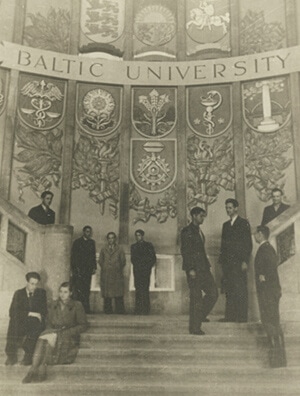 `(…) Our institution will be recorded by history, the reason being that it is unique. Refugees usually have not the mental spirit to create a university, but we had the spirit (…)’
`(…) Our institution will be recorded by history, the reason being that it is unique. Refugees usually have not the mental spirit to create a university, but we had the spirit (…)’
Information Bulletin Baltic University, 13 December 1947.
In 1947 they thought that historians would investigate the Baltic University even after many, many years. It turned out to be otherwise: the archive seemed to be lost, the buildings destroyed by fire and the institute almost forgotten.
But not totally: there are still people who remember this special university, whose career started right there in Hamburg, who have pictures, documents and stories to tell.
It is not yet too late to ask witnesses to tell about this remarkable institute, the students and fraternities. It is still possible to make a documentary film…
I’m a journalist and also make documentaries. When going through the papers of my Estonian father, I came across the subject of the Baltic University. I found his study book of the Baltic University and became interested in this institute.
I found out that already in the summer of 1945 the Latvian professors in the refugee camp in Lübeck were thinking of starting a university, as it was difficult for refugees to obtain a place at German Universities. Professors from Estonia and Lithuania joined and it became a Baltic enterprise.
The planning committee started to work under most difficult conditions: there was no housing available, no equipment, no pens, papers, chairs, desks… There was just an idea. What was achieved within three months was spectacular: a functioning university with eight faculties and 17 departments. In March 1946 the Baltic University opened its doors.
The British Military Government was in favour of a university for displaced persons and so were the first UNRRA representatives. But soon after the University opened it’s doors the problems began: first the word “Baltic” had to disappear from the name (Hamburg DP University) and then the word “university” as well (DP Study Centre). The name had to be changed 11 times.
And there were other problems to be dealt with: the amount of daily calories was reduced, teachers had to be dismissed, students of 25 years and older were not allowed to study and less and less students were admitted and those admitted were allowed to study only for a very short period.
But the teaching staff did what it could: dismissed professors continued their teaching activities. Students of 25 years and older were accepted and more students were allowed to study than numbers officially approved. And they pleaded, successfully, for more food.
The archive of the Baltic University still exists. I found it at the University Library of Uppsala. Reading through the documents of the Baltic University makes you wonder how they got the energy to continue, despite all the problems and the pestering – as I’m afraid this is a word to be used – from the authorities.
The academic staff tried to help the students and tried to continue the work at the university – if necessary elsewhere: from 1947 onwards plans were made to move the whole university to Great Britain, Canada, USA and even Ethiopia. All attempts failed.
In September 1949 the university had to close its doors as most students and teachers had emigrated.
I have started to work on a documentary film, organising interviews and gathering material, to show the hope, courage and determination of the staff and the students. But also what can be achieved, even under most difficult circumstances, with different nationalities, who speak different languages and have a different background, if there is a common goal. I do think the story of the Baltic University is a story we all can learn from.
I’m very thankful to the Estonian American Fund, the Estonian American National Council, Tartu College Toronto, the Latvian Foundation and the American Latvian Association, Cultural Foundation who gave me the possibility to start with research, organise interviews and first a editing.
The first result can be seen on YouTube: http://tinyurl.com/nhhl4q2
I very much hope to finish the film in September, but I’m still short of funding.
In case you would like to help, please contact me.
In March 2016 it will be 70 years since the university opened its doors. To commemorate this fact I’m organising celebrations in different cities, in different parts of the world.
Is there anyone willing to organise or help organise a celebration in New York? Please contact:
Helga Merits
Tollensstraat 62
1053 RW Amsterdam
Holland
or: [email protected]













